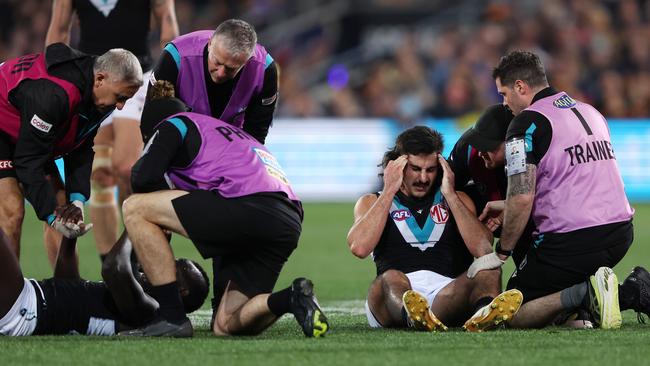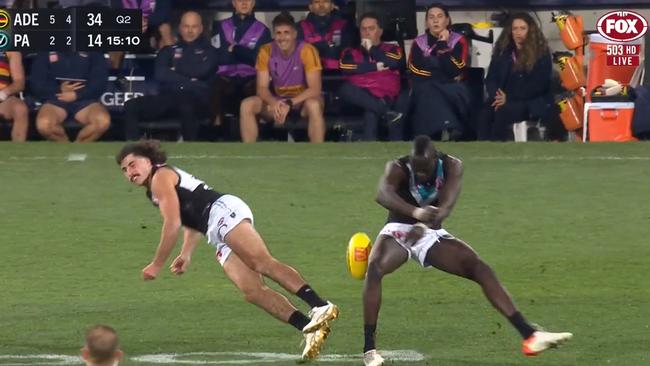Port’s failure a flashpoint for codes’ concussion policies
The decision of Port Adelaide’s club doctor Mark Fisher to let Aliir Allir return to the field has become a flashpoint for concussion policy in the AFL and sport more broadly.

About 10 years ago Hawthorn hard man Dermott Brereton was special guest at a boisterous pre-season lunch at the Adelaide Oval regaling the crowd with war stories from the 1989 grand final, the best and most brutal decider the VFL or AFL has ever produced.
Brereton was lined up and shirt-fronted in the opening seconds at the MCG by Geelong’s Mark Yates, the off-the-ball hit leaving Brereton with two broken ribs and a 5cm gash in his kidney, aptly setting the tone for the all-in carnage that was to follow.
Robert DiPierdomenico played with a punctured lung and John Platten was so heavily concussed he spent the game sitting on the bench asking his teammates where they were, waking up the next day to ask what when the match was starting.
Brereton played the entire game despite being almost knocked out cold the moment it began. He told the Adelaide Oval lunch crowd that he became a bit concerned during half time when he relieved himself and was passing pure blood.
Not concerned about his wellbeing, but concerned he might be subbed off.
“I knew straight away what I had to do – not say a bloody word to anyone,” Brereton said to laughter and applause.
Fast forward to last Saturday. At the same venue, the Adelaide Oval crowd was left stunned by a savage clash between Port Adelaide teammates Aliir Aliir and Lachie Jones who dropped like a sack of spuds after inadvertently colliding head-on at full speed.
More stunning was the return to the field just minutes later of key defender Aliir, who had been staggering around like a newly born foal in the aftermath of the second-quarter collision. Aliir put in an uncharacteristically listless performance for the remainder of the game, against gun Adelaide Crows forward Taylor Walker, who amassed seven goals as the Crows romped home over Port in the local derby known as The Showdown.
The decision of Port Adelaide’s club doctor Mark Fisher to let Aliir return to the field has become a flashpoint for concussion policy in the AFL and sport more broadly.
Set against the mirth which met Brereton’s war tales from 1989, the public mood has clearly shifted. Big hits are no longer celebrated but condemned. Playing on with possible concussion is not seen as manly but madness.
It was for this reason that Port Adelaide chairman and former Seven Sunrise host David Koch was taking his cuts this week, acknowledging the incident was a shocking look.
Koch’s contrition was also fuelled by the fact that a seriously unimpressed AFL launched a formal investigation into Port’s handling of the incident, particularly of Aliir Aliir. That inquiry culminated on Friday with the AFL handing down an unprecedented $100,000 fine for bringing the game into disrepute, the highest penalty ever for a concussion-related breach.
The scale of the fine reflects the outrage of fans at what happened, the poor image it sent for the nation’s most popular game, and the need to take head safety more seriously, especially with litigation now a factor as dozens of ex-players join clash actions for injuries they sustained. The nature of Port’s breach was bizarre.
After the head clash, Lachie Jones underwent a SCAT assessment, as required by the AFL protocols and was cleared of a concussion but ruled out of the game due to a migraine. Oddly, Aliir did not undergo a SCAT assessment and returned to the ground just minutes later after the incident in the second quarter.
Amid a backlash from fans, including even fans of the Port Adelaide Football Club, and with the AFL signalling its intention to investigate, Port did a quick about-face to make amends for the handling of the incident.
Dr Fisher issued a statement saying Port had reviewed what happened and decided that both players would now be placed under the AFL concussion protocols with the mandatory 11-step, minimum 12-day absence from play. “Like Lachie, Aliir’s condition was the subject of testing both on Saturday night after the game and since,” Dr Fisher said in a statement.
“However, upon reviewing the vision of the incident again, Aliir should have undergone SCAT testing at the time immediately following the collision. Both Lachie and Aliir will have a gradual return to play as per the AFL’s concussion management guidelines.”

All this to-ing and fro-ing was unfolding at the same time that the biggest story involving concussion in sport was Queensland rugby league legend Wally Lewis revealing an early diagnosis of chronic traumatic encephalopathy.
With his strong media background – and keen to defend Port from any suggestion of negligence – Koch not only admitted that the club had got things wrong but even willed the AFL to hit it with a fine.
“We stuffed up,” Koch said. “We have admitted to it. Our club doctor has made a mistake and he has admitted to it as well.
“He admitted he should have done the test on Aliir. He is devastated with this. He is highly credentialed, highly regarded in the industry, but he’s not covering it up. He can understand everyone’s concerns. He is embarrassed by it, it shouldn’t happen.”
As to whether the PAFC will be sanctioned, Koch replies: “Yeah I think so, and we deserve one. There’s no doubt about that. We deserve a sanction because those things should not happen. When in doubt, do the test. It’s simple.”
Koch is correct in hailing the credentials of Dr Fisher, who has devoted his working life to protecting the health and welfare of athletes in a range of codes.
Dr Fisher has worked as race doctor for Australia’s premiere cycling event, the Tour Down Under, attended three Olympic and four Commonwealth Games as head doctor for the Australian cycling team and worked in grassroots SA football with the SANFL.
Most pertinently, Dr Fisher was a member of the AFL’s medical advisory board where he helped devise the very concussion protocols he ignored last Saturday, making his brain fade even more unfathomable.
One medico who has seen and was sickened by the Aliir-Jones clash and its aftermath is national concussion and brain injury expert Dr Alan Pearce, a neuroscientist and associate professor in the School of Allied Health at La Trobe University.
“It was pretty confronting footage with both players going down without what looked like any protection,” Dr Pearce told The Weekend Australian.
“Aliir had a rag doll approach coming down with his arms and legs, while the other player showed what we call a fencing position, where the other two arms come up. It’s not an epileptic fit, but it’s certainly a convulsion which clearly shows that both players were concussed.
“For me as a concussion researcher, what happened on the field should have immediately put them into the 12-day protocol. A SCAT test wasn’t needed. On the vision alone they should have been taken out of the game.”
Dr Pearce said that the incident could and should have ramifications not just for concussion policies in the AFL but in all professional and amateur sports, where the idea of having an official club doctor means they can be co-opted or influenced by extraneous factors and input from non-medical staff.
Dr Pearce commended the NRL for already introducing independent doctors and “spotters” who watch for concussions and recommend a course of action at arms’ length from football clubs.
Netball Australia is already considering a similar model and there are calls within the AFL to do the same.
“This is not just an AFL issue; this is something that is happening in many sports around the world,” Dr Pearce said.
“It is actually a lot fairer on the club doctors. They’re in a highly pressured environment, they are not just trying to assess concussion but have other players with hamstring issues and ankles to worry about, and they have got to make split-second decisions which I think is really quite unfair on the doctor.”
Koch points out that one of the biggest advocates of such an approach at the AFL is none other than Port’s own club doctor.
“This is a big discussion among the medicos within the AFL: the need to have an independent sideline doctor just to double-check all of this,” Koch said.
Given the week their club has had, both Koch and Dr Mark Fisher no doubt wish that very system was already in place last Saturday.




To join the conversation, please log in. Don't have an account? Register
Join the conversation, you are commenting as Logout